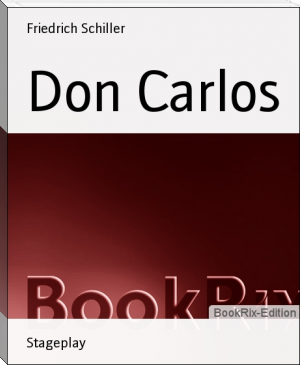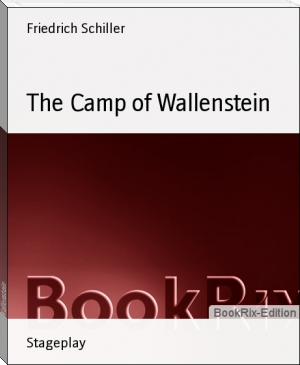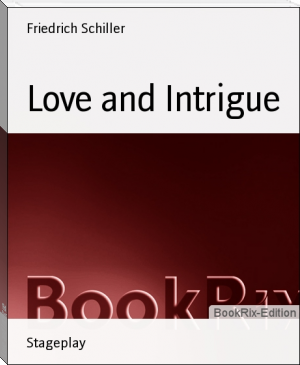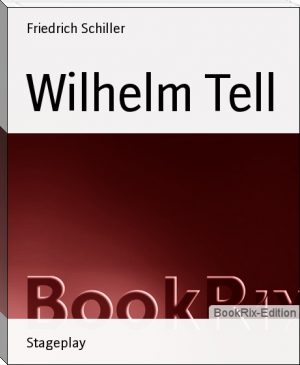Fiesco, Friedrich Schiller [uplifting novels .TXT] 📗

- Author: Friedrich Schiller
Book online «Fiesco, Friedrich Schiller [uplifting novels .TXT] 📗». Author Friedrich Schiller
will seek in her a mistress, and find a prude.
GIANETTINO. Force is the best rhetoric. Lead me to her. Would I could see that republican dog that durst stand in the way of the bear Doria. (Going, meets FIESCO at the door.) Where is the Countess?
SCENE VI.
FIESCO and the former.
FIESCO. I have handed her to her carriage. (Takes GIANETTINO'S hand, and presses it to his breast.) Prince, I am now doubly your slave. To you I bow, as sovereign of Genoa - to your lovely sister, as mistress of my heart.
LOMELLINO. Fiesco has become a mere votary of pleasure. The great world has lost much in you.
FIESCO. But Fiesco has lost nothing in giving up the world. To live is to dream, and to dream pleasantly is to be wise. Can this be done more certainly amid the thunders of a throne, where the wheels of government creak incessantly upon the tortured ear, than on the heaving bosom of an enamored woman? Let Gianettino rule over Genoa; Fiesco shall devote himself to love.
GIANETTINO. Away, Lomellino! It is near midnight. The time draws near
- Lavagna, we thank thee for thy entertainment - I have been satisfied.
FIESCO. That, prince, is all that I can wish.
GIANETTINO. Then good-night! To-morrow we have a party at the palace, and Fiesco is invited. Come, procurator!
FIESCO. Ho! Lights there! Music!
GIANETTINO (haughtily, rushing through the three masks). Make way there for Doria!
ONE OF THE THREE MASKS (murmuring indignantly). Make way? In hell! Never in Genoa!
THE GUESTS (in motion). The prince is going. Good night, Lavagna! (They depart.)
SCENE VII.
The THREE BLACK MASKS and FIESCO. (A pause.)
FIESCO. I perceive some guests here who do not share the pleasure of the feast.
MASKS (murmuring to each other with indignation). No! Not one of us.
FIESCO (courteously). Is it possible that my attention should have been wanting to any one of my guests? Quick, servants! Let the music be renewed, and fill the goblets to the brim. I would not that my friends should find the time hang heavy. Will you permit me to amuse you with fireworks. Would you choose to see the frolics of my harlequin? Perhaps you would be pleased to join the ladies. Or shall we sit down to faro, and pass the time in play?
A MASK. We are accustomed to spend it in action.
FIESCO. A manly answer - such as bespeaks Verrina.
VERRINA (unmasking). Fiesco is quicker to discover his friends beneath their masks than they to discover him beneath his.
FIESCO. I understand you not. But what means that crape of mourning around your arm? Can death have robbed Verrina of a friend, and Fiesco not know the loss?
VERRINA. Mournful tales ill suit Fiesco's joyful feasts.
FIESCO. But if a friend - (pressing his hand warmly.) Friend of my soul! For whom must we both mourn?
VRRRINA. Both! both! Oh, 'tis but too true we both should mourn - yet not all sons lament their mother.
FIESCO. 'Tis long since your mother was mingled with the dust.
VERRINA (with an earnest look). I do remember me that Fiesco once called me brother, because we both were sons of the same country!
FIESCO (jocosely). Oh, is it only that? You meant then but to jest? The mourning dress is worn for Genoa! True, she lies indeed in her last agonies. The thought is new and singular. Our cousin begins to be a wit.
VERRINA. Fiesco! I spoke most seriously.
FIESCO. Certainly - certainly. A jest loses its point when he who makes it is the first to laugh. But you! You looked like a mute at a funeral. Who could have thought that the austere Verrina should in his old age become such a wag!
SACCO. Come, Verrina. He never will be ours.
FIESCO. Be merry, brother. Let us act the part of the cunning heir, who walks in the funeral procession with loud lamentations, laughing to himself the while, under the cover of his handkerchief. 'Tis true we may be troubled with a harsh step-mother. Be it so - we will let her scold, and follow our own pleasures.
VERRINA (with great emotion). Heaven and earth! Shall we then do nothing? What is to become of you, Fiesco? Where am I to seek that determined enemy of tyrants? There was a time when but to see a crown would have been torture to you. Oh, fallen son of the republic! By heaven, if time could so debase my soul I would spurn immortality.
FIESCO. O rigid censor! Let Doria put Genoa in his pocket, or barter it with the robbers of Tunis. Why should it trouble us? We will drown ourselves in floods of Cyprian wine, and revel it in the sweet caresses of our fair ones.
VERRINA (looking at him with earnestness). Are these indeed your serious thoughts?
FIESCO. Why should they not be, my friend? Think you 'tis a pleasure to be the foot of that many-legged monster, a republic? No - thanks be to him who gives it wings, and deprives the feet of their functions! Let Gianettino be the duke, affairs of state shall ne'er lie heavy on our heads.
VERRINA. Fiesco! Is that truly and seriously your meaning?
FIESCO. Andreas adopts his nephew as a son, and makes him heir to his estates; what madman will dispute with him the inheritance of his power?
VERRINA (with the utmost indignation). Away, then, Genoese! (Leaves FIESCO hastily, the rest follow.)
FIESCO. Verrina! Verrina! Oh, this republican is as hard as steel!
SCENE VIII.
FIESCO. A MASK entering.
MASK. Have you a minute or two to spare, Lavagna?
FIESCO (in an obliging manner). An hour if you request it.
MASK. Then condescend to walk into the fields with me.
FIESCO. It wants but ten minutes of midnight.
MASK. Walk with me, Count, I pray.
FIESCO. I will order my carriage.
MASK. That is useless - I shall send one horse: we want no more, for only one of us, I hope, will return.
FIESCO (with surprise). What say you?
MASK. A bloody answer will be demanded of you, touching a certain tear.
FIESCO. What tear?
MASK. A tear shed by the Countess of Lavagna. I am acquainted with that lady, and demand to know how she has merited to be sacrificed to a worthless woman?
FIESCO. I understand you now; but let me ask who 'tis that offers so strange a challenge?
MASK. It is the same that once adored the lady Zibo, and yielded her to Fiesco.
FIESCO. Scipio Bourgognino!
BOURGOGNINO (unmasking). And who now stands here to vindicate his honor, that yielded to a rival base enough to tyrannize over innocence.
FIESCO (embraces him with ardor). Noble youth! thanks to the sufferings of my consort, which have drawn forth the manly feelings of your soul; I admire your generous indignation - but I refuse your challenge.
BOURGOGNINO (stepping back). Does Fiesco tremble to encounter the first efforts of my sword?
FIESCO. No, Bourgognino! against a nation's power combined I would boldly venture, but not against you. The fire of your valor is endeared to me by a most lovely object - the will deserves a laurel, but the deed would be childish.
BOURGOGNINO (with emotion). Childish, Count! women can only weep at injuries. 'Tis for men to revenge them.
FIESCO. Uncommonly well said - but fight I will not.
BOURGOGNINO (turning upon him contemptuously). Count, I shall despise you.
FIESCO (with animation). By heaven, youth, that thou shalt never do - not even if virtue fall in value, shall I become a bankrupt. (Taking him by the hand, with a look of earnestness.) Did you ever feel for me - what shall I say - respect?
BOURGOGNINO. Had I not thought you were the first of men I should not have yielded to you.
FIESCO. Then, my friend, be not so forward to despise a man who once could merit your respect. It is not for the eye of the youthful artist to comprehend at once the master's vast design. Retire, Bourgognino, and take time to weigh the motives of Fiesco's conduct!
[Exit BOURGOGNINO, in silence.
Go! noble youth! if spirits such as thine break out in flames in thy country's cause, let the Dorias see that they stand fast!
SCENE IX.
FIESCO. - The MOOR entering with an appearance of timidity,
and looking round cautiously.
FIESCO (fixing his eye on him sharply). What wouldst thou here? Who art thou?
MOOR (as above). A slave of the republic.
FIESCO (keeping his eye sharply upon him). Slavery is a wretched craft. What dost thou seek?
MOOR. Sir, I am an honest man.
FIESCO. Wear then that label on thy visage, it will not be superfluous - but what wouldst thou have?
MOOR (approaching him, FIESCO draws back). Sir, I am no villain.
FIESCO. 'Tis well thou hast told me that - and yet - 'tis not well either (impatiently). What dost thou seek?
MOOR (still approaching). Are you the Count Lavagna?
FIESCO (haughtily). The blind in Genoa know my steps - what wouldst thou with the Count?
MOOR (close to him). Be on your guard, Lavagna!
FIESCO (passing hastily to the other side). That, indeed, I am.
MOOR (again approaching). Evil designs are formed against you, Count.
FIESCO (retreating). That I perceive.
MOOR. Beware of Doria!
FIESCO (approaching him with an air of confidence). Perhaps my suspicions have wronged thee, my friend - Doria is indeed the name I dread.
MOOR. Avoid the man, then. Can you read?
FIESCO. A curious question! Thou hast known, it seems, many of our cavaliers. What writing hast thou?
MOOR. Your name is amongst other condemned sinners. (Presents a paper, and draws close to FIESCO, who is standing before a looking-glass and glancing over the paper - the MOOR steals round him, draws a dagger, and is going to stab.)
FIESCO (turning round dexterously, and seizing the MOOR'S arm.) Stop, scoundrel! (Wrests the dagger from him.)
MOOR (stamps in a frantic manner). Damnation! Your pardon - sire!
FIESCO (seizing him, calls with a loud voice). Stephano! Drullo! Antonio! (holding the MOOR by the throat.) Stay, my friend! - what hellish villany! (Servants enter.) Stay, and answer - thou hast performed thy task like a bungler. Who pays thy wages?
MOOR (after several fruitless attempts to escape). You cannot hang me higher than the gallows are - -
FIESCO. No - be comforted - not on the horns of the moon, but higher than ever yet were gallows - yet hold! Thy scheme was too politic to be of thy own contrivance speak, fellow! who hired thee?
MOOR. Think me a rascal, sir, but not a fool.
FIESCO. What, is the scoundrel proud? Speak, sirrah! Who hired thee?
MOOR (aside). Shall I alone be called a fool? Who hired me? 'Twas but a hundred miserable sequins. Who hired me, did you ask? Prince Gianettino.
FIESCO (walking about in a passion). A hundred sequins? And is that all the value set upon Fiesco's head? Shame on thee, Prince of Genoa! Here, fellow (taking money from an escritoire), are a thousand for thee. Tell thy master he is a
GIANETTINO. Force is the best rhetoric. Lead me to her. Would I could see that republican dog that durst stand in the way of the bear Doria. (Going, meets FIESCO at the door.) Where is the Countess?
SCENE VI.
FIESCO and the former.
FIESCO. I have handed her to her carriage. (Takes GIANETTINO'S hand, and presses it to his breast.) Prince, I am now doubly your slave. To you I bow, as sovereign of Genoa - to your lovely sister, as mistress of my heart.
LOMELLINO. Fiesco has become a mere votary of pleasure. The great world has lost much in you.
FIESCO. But Fiesco has lost nothing in giving up the world. To live is to dream, and to dream pleasantly is to be wise. Can this be done more certainly amid the thunders of a throne, where the wheels of government creak incessantly upon the tortured ear, than on the heaving bosom of an enamored woman? Let Gianettino rule over Genoa; Fiesco shall devote himself to love.
GIANETTINO. Away, Lomellino! It is near midnight. The time draws near
- Lavagna, we thank thee for thy entertainment - I have been satisfied.
FIESCO. That, prince, is all that I can wish.
GIANETTINO. Then good-night! To-morrow we have a party at the palace, and Fiesco is invited. Come, procurator!
FIESCO. Ho! Lights there! Music!
GIANETTINO (haughtily, rushing through the three masks). Make way there for Doria!
ONE OF THE THREE MASKS (murmuring indignantly). Make way? In hell! Never in Genoa!
THE GUESTS (in motion). The prince is going. Good night, Lavagna! (They depart.)
SCENE VII.
The THREE BLACK MASKS and FIESCO. (A pause.)
FIESCO. I perceive some guests here who do not share the pleasure of the feast.
MASKS (murmuring to each other with indignation). No! Not one of us.
FIESCO (courteously). Is it possible that my attention should have been wanting to any one of my guests? Quick, servants! Let the music be renewed, and fill the goblets to the brim. I would not that my friends should find the time hang heavy. Will you permit me to amuse you with fireworks. Would you choose to see the frolics of my harlequin? Perhaps you would be pleased to join the ladies. Or shall we sit down to faro, and pass the time in play?
A MASK. We are accustomed to spend it in action.
FIESCO. A manly answer - such as bespeaks Verrina.
VERRINA (unmasking). Fiesco is quicker to discover his friends beneath their masks than they to discover him beneath his.
FIESCO. I understand you not. But what means that crape of mourning around your arm? Can death have robbed Verrina of a friend, and Fiesco not know the loss?
VERRINA. Mournful tales ill suit Fiesco's joyful feasts.
FIESCO. But if a friend - (pressing his hand warmly.) Friend of my soul! For whom must we both mourn?
VRRRINA. Both! both! Oh, 'tis but too true we both should mourn - yet not all sons lament their mother.
FIESCO. 'Tis long since your mother was mingled with the dust.
VERRINA (with an earnest look). I do remember me that Fiesco once called me brother, because we both were sons of the same country!
FIESCO (jocosely). Oh, is it only that? You meant then but to jest? The mourning dress is worn for Genoa! True, she lies indeed in her last agonies. The thought is new and singular. Our cousin begins to be a wit.
VERRINA. Fiesco! I spoke most seriously.
FIESCO. Certainly - certainly. A jest loses its point when he who makes it is the first to laugh. But you! You looked like a mute at a funeral. Who could have thought that the austere Verrina should in his old age become such a wag!
SACCO. Come, Verrina. He never will be ours.
FIESCO. Be merry, brother. Let us act the part of the cunning heir, who walks in the funeral procession with loud lamentations, laughing to himself the while, under the cover of his handkerchief. 'Tis true we may be troubled with a harsh step-mother. Be it so - we will let her scold, and follow our own pleasures.
VERRINA (with great emotion). Heaven and earth! Shall we then do nothing? What is to become of you, Fiesco? Where am I to seek that determined enemy of tyrants? There was a time when but to see a crown would have been torture to you. Oh, fallen son of the republic! By heaven, if time could so debase my soul I would spurn immortality.
FIESCO. O rigid censor! Let Doria put Genoa in his pocket, or barter it with the robbers of Tunis. Why should it trouble us? We will drown ourselves in floods of Cyprian wine, and revel it in the sweet caresses of our fair ones.
VERRINA (looking at him with earnestness). Are these indeed your serious thoughts?
FIESCO. Why should they not be, my friend? Think you 'tis a pleasure to be the foot of that many-legged monster, a republic? No - thanks be to him who gives it wings, and deprives the feet of their functions! Let Gianettino be the duke, affairs of state shall ne'er lie heavy on our heads.
VERRINA. Fiesco! Is that truly and seriously your meaning?
FIESCO. Andreas adopts his nephew as a son, and makes him heir to his estates; what madman will dispute with him the inheritance of his power?
VERRINA (with the utmost indignation). Away, then, Genoese! (Leaves FIESCO hastily, the rest follow.)
FIESCO. Verrina! Verrina! Oh, this republican is as hard as steel!
SCENE VIII.
FIESCO. A MASK entering.
MASK. Have you a minute or two to spare, Lavagna?
FIESCO (in an obliging manner). An hour if you request it.
MASK. Then condescend to walk into the fields with me.
FIESCO. It wants but ten minutes of midnight.
MASK. Walk with me, Count, I pray.
FIESCO. I will order my carriage.
MASK. That is useless - I shall send one horse: we want no more, for only one of us, I hope, will return.
FIESCO (with surprise). What say you?
MASK. A bloody answer will be demanded of you, touching a certain tear.
FIESCO. What tear?
MASK. A tear shed by the Countess of Lavagna. I am acquainted with that lady, and demand to know how she has merited to be sacrificed to a worthless woman?
FIESCO. I understand you now; but let me ask who 'tis that offers so strange a challenge?
MASK. It is the same that once adored the lady Zibo, and yielded her to Fiesco.
FIESCO. Scipio Bourgognino!
BOURGOGNINO (unmasking). And who now stands here to vindicate his honor, that yielded to a rival base enough to tyrannize over innocence.
FIESCO (embraces him with ardor). Noble youth! thanks to the sufferings of my consort, which have drawn forth the manly feelings of your soul; I admire your generous indignation - but I refuse your challenge.
BOURGOGNINO (stepping back). Does Fiesco tremble to encounter the first efforts of my sword?
FIESCO. No, Bourgognino! against a nation's power combined I would boldly venture, but not against you. The fire of your valor is endeared to me by a most lovely object - the will deserves a laurel, but the deed would be childish.
BOURGOGNINO (with emotion). Childish, Count! women can only weep at injuries. 'Tis for men to revenge them.
FIESCO. Uncommonly well said - but fight I will not.
BOURGOGNINO (turning upon him contemptuously). Count, I shall despise you.
FIESCO (with animation). By heaven, youth, that thou shalt never do - not even if virtue fall in value, shall I become a bankrupt. (Taking him by the hand, with a look of earnestness.) Did you ever feel for me - what shall I say - respect?
BOURGOGNINO. Had I not thought you were the first of men I should not have yielded to you.
FIESCO. Then, my friend, be not so forward to despise a man who once could merit your respect. It is not for the eye of the youthful artist to comprehend at once the master's vast design. Retire, Bourgognino, and take time to weigh the motives of Fiesco's conduct!
[Exit BOURGOGNINO, in silence.
Go! noble youth! if spirits such as thine break out in flames in thy country's cause, let the Dorias see that they stand fast!
SCENE IX.
FIESCO. - The MOOR entering with an appearance of timidity,
and looking round cautiously.
FIESCO (fixing his eye on him sharply). What wouldst thou here? Who art thou?
MOOR (as above). A slave of the republic.
FIESCO (keeping his eye sharply upon him). Slavery is a wretched craft. What dost thou seek?
MOOR. Sir, I am an honest man.
FIESCO. Wear then that label on thy visage, it will not be superfluous - but what wouldst thou have?
MOOR (approaching him, FIESCO draws back). Sir, I am no villain.
FIESCO. 'Tis well thou hast told me that - and yet - 'tis not well either (impatiently). What dost thou seek?
MOOR (still approaching). Are you the Count Lavagna?
FIESCO (haughtily). The blind in Genoa know my steps - what wouldst thou with the Count?
MOOR (close to him). Be on your guard, Lavagna!
FIESCO (passing hastily to the other side). That, indeed, I am.
MOOR (again approaching). Evil designs are formed against you, Count.
FIESCO (retreating). That I perceive.
MOOR. Beware of Doria!
FIESCO (approaching him with an air of confidence). Perhaps my suspicions have wronged thee, my friend - Doria is indeed the name I dread.
MOOR. Avoid the man, then. Can you read?
FIESCO. A curious question! Thou hast known, it seems, many of our cavaliers. What writing hast thou?
MOOR. Your name is amongst other condemned sinners. (Presents a paper, and draws close to FIESCO, who is standing before a looking-glass and glancing over the paper - the MOOR steals round him, draws a dagger, and is going to stab.)
FIESCO (turning round dexterously, and seizing the MOOR'S arm.) Stop, scoundrel! (Wrests the dagger from him.)
MOOR (stamps in a frantic manner). Damnation! Your pardon - sire!
FIESCO (seizing him, calls with a loud voice). Stephano! Drullo! Antonio! (holding the MOOR by the throat.) Stay, my friend! - what hellish villany! (Servants enter.) Stay, and answer - thou hast performed thy task like a bungler. Who pays thy wages?
MOOR (after several fruitless attempts to escape). You cannot hang me higher than the gallows are - -
FIESCO. No - be comforted - not on the horns of the moon, but higher than ever yet were gallows - yet hold! Thy scheme was too politic to be of thy own contrivance speak, fellow! who hired thee?
MOOR. Think me a rascal, sir, but not a fool.
FIESCO. What, is the scoundrel proud? Speak, sirrah! Who hired thee?
MOOR (aside). Shall I alone be called a fool? Who hired me? 'Twas but a hundred miserable sequins. Who hired me, did you ask? Prince Gianettino.
FIESCO (walking about in a passion). A hundred sequins? And is that all the value set upon Fiesco's head? Shame on thee, Prince of Genoa! Here, fellow (taking money from an escritoire), are a thousand for thee. Tell thy master he is a
Free e-book «Fiesco, Friedrich Schiller [uplifting novels .TXT] 📗» - read online now
Similar e-books:





Comments (0)